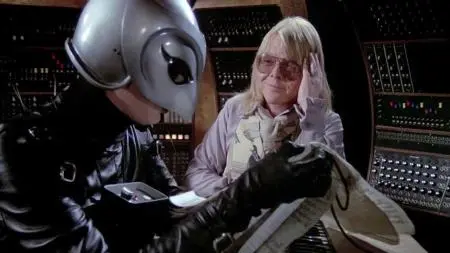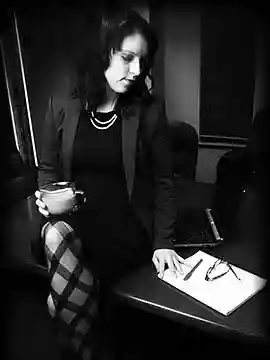My last column listed 5 reasons to hire a freelance editor and also described how to go about submitting work if you don't. This week, I want to share some tips from The Other Side about what to do if you make the leap to hire a freelance editor for your manuscript. Here's what to do—and what to avoid.
I’ve been freelance editing full time for three years now. Some authors who approach me for services have demanded no less than an editing sample, references, phone interview, in-person interview, a list of books I’ve edited, my educational background, and the performance of a voodoo ritual wherein I offer up a sacrificial goat to the gods of publication. I’ve jumped through hoops to convince authors they can trust that I will edit their work skillfully and professionally, because their book is their precious baby. As a writer myself, I understand that. And it’s smart. Don’t hand over money to an editor you don’t one-hundred-percent trust. And make sure you shop around.
There is a way to go about the process. It is a dance. A literary courtship that may be the start of a beautiful creative/professional relationship. You don't want to be the scary demanding client that no editor wants to take on. But you need to know without a doubt that you've found the right editor for your work and that you haven't been taken in by a hack—because the editor predators are out there! You want to know you aren’t getting ripped off, and you want to know your work is in professional, talented hands.
Step 1: Introduce yourself and your project.
Here's a real email I received last month. Names have been changed to protect the guilty.
Hi,
I need Grammar editing / proofreading of 300 pages. The price? Regards, Author Who Is About To Get A Long List Of Questions In Response
This is a perfect example of how NOT to kick off the author/editor courtship.
Send an email to the editor or a message through the editor’s website. But make it as informative as possible without crossing over into giving away sensitive information (like attaching your entire manuscript—please don’t do that).
Let the editor know:
- genre
- word count (approximate word count is fine if you are starting the search process before the book is complete)
- deadline (if you have one)
- what type of editing you are looking for / the number of editing passes you need
That last item tends to get ignored the most. Do you need developmental editing of the story content? Or a straight copyedit of grammar, spelling, sentence structure, etc.? It’s possible you might need proofreading (you can look into proofreading rates here) if you are an amazing self-editor or if your book has already gone through a round of professional copyediting. You may be looking for more than one pass with an editor if you want developmental editing, followed by your added revisions, followed by copyediting. If you don’t know exactly what you need, let the editor know that. When authors tell me they aren’t sure, I offer to copyedit and to let them know if I see any developmental issues. Maybe you completely forgot about a character that you introduced twelve chapters ago. Even if I’m copyediting, I’m going tell you about glaring content mistakes.
Step 2: In that same initial message, list your questions for the editor.
This first email is a crucial one as far as efficiency goes, so you want to take care of as much as possible in that initial contact. The less time you spend going back and forth playing the questions game, the better. The courtship process is important and necessary to build trust, but you don’t want to spend the time and effort it takes to write an entire novel doing it.
Ask the editor about:
- turnaround time
- editing experience with your genre
- book links from previous editing jobs
- references
- rates
- payment options
The savvy editor provides the most information possible on his or her website. You obviously don't need to waste either yours or the editor's time asking questions that are clearly answered on the website. But sometimes not every question can be answered there. You may have questions specific to your unique situation, or perhaps you got the editor's email through word-of-mouth. The rates thing will be a necessary discussion no matter what the website says. It’s common that editors don’t make their rates abundantly clear on their websites. This is not to drive you nuts. It’s because most editors have to consider what kind of editing you are looking for and take a look at a sample of your work to determine the cost involved (i.e., how much shit is wrong with the first ten pages from chapter 14). It’s like fixing your car that’s making a weird sound from a mysterious location or describing flood damage to your contractor. We really can’t tell you how much labor is involved until we take a good look at the problem. Especially if you are a brand new shiny client.

Step 3: Get that sample edit! Or suffer the dire all-consuming consequences of the fiery pits of buyer's remorse HELL!!!
Before we get into this crucial element, here's a fun little cautionary (and true) tale from the editor's side. There was a certain self-published author, we'll call him Dishonest Douche Bag Scamming Fake Author, but DD for short. DD approached an editor with that first courtship email. After a couple of email exchanges, the editor agreed to do a sample edit. DD sent a random chapter for a sample, and the editor never heard back after the completed sample was sent. In the professional editing online community, DD came up several times. It came to be known that he was approaching hordes of editors, asking for sample edits of different parts of his book. His scheme is to edit an entire novel with free samples. And oh, what a mess of style consistency it will be! (He's still making the rounds today.) Editors talk to each other. We have a very particular set of skills; skills we have acquired over very long careers. Skills that make us a nightmare for people like DD. This is a rare thing, and I've only experienced something like it once in my three years of full-time work. Just be aware—there are reasons why some editors charge for a sample (other than the fact that they are time-consuming).
An editing sample is crucial when courting a new editor. As a writer myself, with little to no disposable income set aside for scammers, it's important to see the quality of an editor's work before I pay. I carry this understanding with me as an editor. There is some debate on whether writers make good editors, but it has always helped me empathize with clients and understand their concerns. That is why I provide a free sample edit when asked. I have editing samples available on my website, which is helpful. But what if a sneaky hack has procured editing samples on the black market of excellent editing samples and passes them off to you as their own work? This is paranoia at it's most useful, and in this day and age, it's necessary.
I don't sample a whole lot of the text. Sometimes it's just a page or two (unless the writer's work is squeaky clean, then I do more). I sample edit enough to show my editing style and skills. I provide margin comments to explain reasons for suggested edits. I offer a close look into my methods and qualifications before I expect the writer to trust me. This way, they can know what they are paying for. When you are looking for editors, find one who will do this for you.

Step 4: Close the deal / Contracts don't have to be scary.
When you are confident you have made your choice, tell the editor that and discuss the next steps. Ask the editor to provide a contract outlining the terms of the agreement. The writer needs to know I'm not going to take the first half payment and run. I need to know I'm not going to deliver the edited file and never receive payment for the final invoice. Here are the basic things that need to be included in the contract:
- Editorial tasks: This outlines the scope of the job. Is this developmental editing? Copyediting? One round or two? Will the editor be available to you for communication, or will you have to pay for a phone call or email time if you have questions after you receive the completed edits?
- Delivery: How is the manuscript passed along? What is the file type? Will there be possible compatibility issues? (Macs always fuck with my track changes, a word to the wise.)
- Payment: How is payment made? Is it all up front? Are partial payments to be made once milestones are reached in the job? Half first, half after the edit is complete? (My preferred method.)
- Confidentiality clause. Basically something that states that the editor agrees not to reproduce, give, or show anyone any material sent to her by the author for editing purposes.
- Termination: The "Shit Happens" clause. For example: Once the project is in process, either party may terminate this agreement in the event of material change of circumstance. Payment is made for work completed by the editor, or, overpayment is refunded for work not yet completed.
Step 5: Don't you forget about proofreading.
If you are submitting to an agent or publisher, you may only need a developmental edit or a copyedit. You can proofread yourself or find a willing victim to help you out. Just be aware that a copyedit does not mean that the manuscript is ready for publication. In a publishing house, the manuscript goes through multiple editors and multiple rounds before it is publication-perfect. You may have paid an editor to spend 25 grueling hours on your manuscript tightening lines, addressing all copyediting issues, and asking you for clarification on certain indecipherable phrases, but when your 60,000-word novel is returned with 15,000 suggested edits, just know that a proofread is needed after the changes are applied or rejected. If you are putting the book out yourself, a thorough proofread (or two) is essential after the book has been edited professionally. This may involve hiring a new proofreader if you want that lovely fresh pair of eyes.

About the author
Holly Slater is a freelance editor and writer. She slowly built her business at espressoeditor.com until that glorious day she was able to quit her regular job and venture into the world of full-time freelancing. She loves to tell you everything that’s wrong with your book, but she’s super-duper nice about it. Holly holds a B.A. in English and creative writing from Southern New Hampshire University and has been editing and writing for ten years. Her short story collection, Sweet Violent Femmes, is a display of bizarre erotic horror with a feminist bent. Holly lives in Cincinnati with her filmmaker fiancé and her talented theater-performing son.








